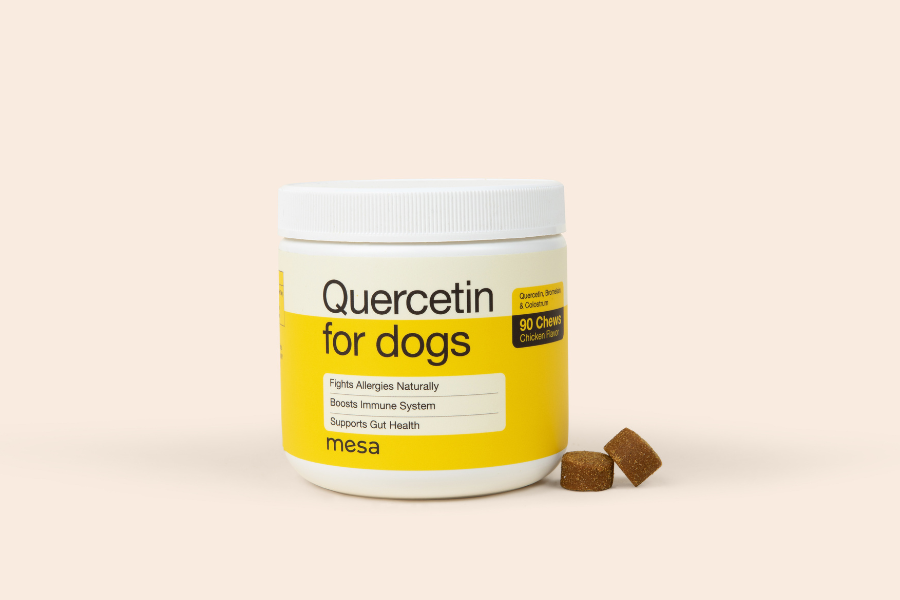Dearest Dog Lovers,
Today we're going to chat about an ingredient that is (and has been) in the wellness lime light... apple cider vinegar, also referred to simply as ACV. You may have heard about ACV's fantastic benefits for humans (many true, while other claims still have yet to be proved). But what about apple cider vinegar for pups? Can it benefit dogs in the same way that it can benefit humans? Let's dig into these deets and more (with our front paws, obvi).
What is Apple Cider Vinegar?
First things first. Apple cider vinegar is made from fermented apple juice. The fermentation process converts the sugars in apples to acetic acid, which is the active component in vinegar. It’s known for its tangy flavor and potential health benefits, including antimicrobial and antioxidant effects.
Potential Benefits of Apple Cider Vinegar for Dogs
Improves Digestion
One of the standout benefits of ACV is its ability to aid digestion. Just like in humans, ACV can help balance the stomach's pH level, making it easier for your dog to digest food. This can be especially helpful for dogs with sensitive stomachs or those prone to digestive issues.
Enhances Skin Health
Is your dog constantly scratching or dealing with dry skin? ACV might come to the rescue. Diluted apple cider vinegar can be applied topically to soothe itching and even combat skin infections. The properties of ACV can help keep your dog’s skin healthy and free from irritants (though research thus far has not indicated that ACV can alter bacteria on the skin).
Natural Flea Repellent
Nobody likes fleas, especially not your dog. ACV can act as a natural flea repellent. While it might not kill fleas on contact, the strong smell and acidic nature of vinegar can deter fleas from making a home on your pup. Simply dilute ACV with water and spray it on your dog’s coat.
Supports Joint Health
Arthritis and joint pain are common issues in older dogs. Some dog owners swear by ACV, or Salmon Oil for dogs, for their anti-inflammatory properties that can help reduce joint pain and improve mobility. While scientific evidence is limited, anecdotal reports suggest that adding a small amount of ACV to your dog’s diet might offer some relief.
How to Use Apple Cider Vinegar for Dogs
Internal Use
If you’re considering adding ACV to your dog’s diet, start slow. Mix a small amount (about one teaspoon for small dogs and up to one tablespoon for larger dogs) into their water bowl or food. Keep an eye on them to make sure they don’t have any adverse reactions.
External Use
For topical applications, always dilute ACV with water. A 50/50 mixture of water and ACV works well for most dogs. You can use this mixture as a rinse after baths or as a spray to help manage itchy skin.
Precautions to Keep in Mind
- While apple cider vinegar has many potential benefits, it’s essential to exercise caution.
- Always Dilute: Undiluted vinegar can be too harsh for your dog's skin and digestive system.
- Monitor Reactions: Some dogs might be sensitive to ACV. If you notice any adverse reactions like vomiting, diarrhea, or increased itching, discontinue use immediately.
- Consult Your Vet: Before making any significant changes to your dog’s diet or healthcare routine, it’s wise to consult your veterinarian.
Why and When It Is Important to Consult Your Vet
Alright, dog enthusiasts, let's keep it real. While apple cider vinegar might sound like a miracle cure for everything from itchy skin to digestive issues, it's crucial to loop in your vet before you dive in headfirst. Your vet knows your dog’s health history, sensitivities, and specific needs better than anyone. They’re the best person to judge whether ACV is a good idea for your pet.
Here’s the deal: Some pups might have allergies or existing medical conditions that could be aggravated by ACV. If your dog is on medication, there might be interactions to consider. And let's not forget the simple fact that every dog is unique—what works wonders for one might be a disaster for another.
When should you hit up your vet? Definitely consult them before adding ACV to your dog’s diet, especially if your dog has pre-existing conditions like diabetes, kidney issues, or a history of gastrointestinal problems. And if you notice any weird reactions—vomiting, diarrhea, excessive itching—stop using ACV immediately and call your vet. Better safe than sorry, right?
Final Thoughts
Apple cider vinegar may be worth a try for your dog, as it can offer a paw-ful of benefits, including acting as a flea repellant and as a digestive aid. As you should do when introducing anything new to your dog's diet or wellness regimen, it is key to start slow, and monitor them for any adverse reactions. It is also a good idea to check in with your vet before using apple cider vinegar for your dog (it may not be for everyone).
FAQ
What Does Apple Cider Vinegar Do for Dogs?
So, what's the real deal with apple cider vinegar and our pups? Let's break it down. ACV offers a bunch of perks that can spruce up your dog's health and well-being. For starters, it can work wonders on their digestion, making meals go down a bit smoother. No more tummy troubles! Then there's the skin benefits—ACV can soothe that pesky itch and fight off infections. It's like a natural, no-nasties remedy that helps keep their skin in top shape.
Next up, let's talk pests. Fleas? Forget about 'em. ACV can act as a natural flea repellent, so you can ditch the chemical-laden sprays. And for those senior pups dealing with achy joints, some say that ACV's anti-inflammatory vibes can help improve their mobility. While not a miracle cure, it’s definitely worth a shot. Just remember, like with anything, moderation is key. Too much of a good thing can turn sour, so keep an eye out and chat with your vet if you're unsure.
In short, apple cider vinegar can be a game-changer for your canine companion. Whether it’s an itchy spot, a flea dilemma, or just overall wellness you're after, ACV has the potential to make a positive impact. Give it a try and see those tails wag even more! 😄
Can Apple Cider Vinegar Cure a Dog's Yeast Infection?
Alright, let's tackle the million-dollar question: can apple cider vinegar actually cure a dog's yeast infection? Yeast infections are a pain for both you and your dog, causing itching, redness, and a whole lot of discomfort. The good news is, ACV might just be your secret weapon. The antifungal properties of apple cider vinegar make it a potential remedy for combating yeast overgrowth. You can use a diluted mixture (remember, always dilute!) and apply it directly to the affected area. A 50/50 mix of ACV and water sprayed or dabbed onto the skin can help manage the infection and soothe irritation.
But let's keep it real—I wouldn't call it a "cure-all." While ACV can certainly help alleviate symptoms and control the infection, it's not a substitute for veterinary treatment, especially in severe cases. If your dog’s yeast infection is particularly nasty or persistent, a vet visit is non-negotiable. They can offer stronger antifungal medications or creams that might do the trick more efficiently. In the meantime, using ACV as part of your dog’s skincare routine can provide some much-needed relief and keep minor infections at bay.
So, in a nutshell, ACV can be a helpful tool in the fight against yeast infections, but don't rely on it alone. Combine it with good ol' vet advice and you’ll be on the right track to getting that yeast situation under control. Keep an eye on your pup, and stay tuned for more tips and tricks on keeping them healthy and happy!
Does Apple Cider Vinegar Keep Ticks Off Dogs?
Alright, let's dive into another hot topic: can apple cider vinegar keep ticks off your dog? If ticks give you the creeps, you're not alone. These little bloodsuckers are more than just a nuisance; they can carry some nasty diseases that you definitely don't want your furry friend catching.
So, what’s the scoop on using ACV for tick prevention? ACV has a pretty strong smell and an acidic nature that can make your dog’s skin less appealing to ticks. Sounds like a win, right? To use ACV as a tick repellent, you can make a simple spray by diluting it with water—again, that 50/50 mix works wonders. Spritz it on your dog’s coat before your next walk in the woods or romp in the tall grass. Just make sure to avoid the face and any open wounds.
Now, here’s the rebel’s disclaimer: while ACV might help reduce the chances of ticks latching onto your pup, it’s not a foolproof solution. It's more of a "bonus layer" in your anti-tick strategy rather than the end-all-be-all answer. Ticks are tenacious little pests, and sometimes you need more robust protection like tick collars, medications, or even a vet-recommended preventatives.
In short, give ACV a shot for an extra boost of tick protection, but don't ditch the heavy-duty stuff just yet. Keep an eye on your dog during tick season and always do a thorough tick check after outdoor adventures. Stay savvy, folks, and keep those ticks at bay!
Will Apple Cider Vinegar Clean Dogs' Teeth?
Alright, brushing your dog's teeth might not be at the top of your list of fun activities, but it's super important for their health. So, can apple cider vinegar help out with that task? The short answer is, kinda. Apple cider vinegar has some antibacterial properties that can help reduce the plaque and bacteria buildup in your dog’s mouth. You can try adding a tiny bit of ACV to your dog’s water bowl—a teaspoon per quart of water should do the trick. This can help freshen their breath and keep their teeth a bit cleaner.
But hold up, before you start dousing your pup's water with ACV, there are a couple of things to keep in mind. Too much vinegar can mess with your dog’s stomach and teeth, making things worse instead of better. It's definitely not a replacement for actual dental care like brushing or professional cleanings. Think of ACV as a supplementary helper rather than a mainstay dental hygiene method. And, as always, combining this with regular vet visits ensures your pup's teeth stay in tip-top shape.
So, while ACV can play a part in keeping your dog's teeth cleaner and breath fresher, don't toss out the toothbrush just yet. Keep a balanced approach, and you'll be doing right by your four-legged buddy.
References
1) Luu LA, Flowers RH, Gao Y, Wu M, Gasperino S, Kellams AL, Preston DC, Zlotoff BJ, Wisniewski JA, Zeichner SL. Apple cider vinegar soaks do not alter the skin bacterial microbiome in atopic dermatitis. PLoS One. 2021 Jun 2;16(6):e0252272. doi: 10.1371/journal.pone.0252272. PMID: 34077434; PMCID: PMC8172074.



